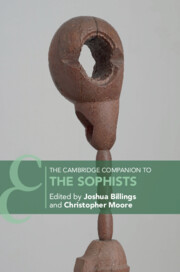Book contents
- The Cambridge Companion to the Sophists
- Other Volumes in the Series of Cambridge Companions
- The Cambridge Companion to the Sophists
- Copyright page
- Contents
- Contributors
- Note on the Text
- Introduction
- Part I Contexts
- 1 Sophia before the Sophists
- 2 The Sophists between Aristocracy and Democracy
- 3 The Professional Lives of the Sophists
- 4 The Sophists in the Fifth-Century Enlightenment
- Part II Thought
- Part III Receptions
- Appendix: The People of the Sophistic Period
- Select Bibliography
- Index
- OTHER VOLUMES IN THE SERIES OF CAMBRIDGE COMPANIONS (continued from page ii)
4 - The Sophists in the Fifth-Century Enlightenment
from Part I - Contexts
Published online by Cambridge University Press: 23 December 2023
- The Cambridge Companion to the Sophists
- Other Volumes in the Series of Cambridge Companions
- The Cambridge Companion to the Sophists
- Copyright page
- Contents
- Contributors
- Note on the Text
- Introduction
- Part I Contexts
- 1 Sophia before the Sophists
- 2 The Sophists between Aristocracy and Democracy
- 3 The Professional Lives of the Sophists
- 4 The Sophists in the Fifth-Century Enlightenment
- Part II Thought
- Part III Receptions
- Appendix: The People of the Sophistic Period
- Select Bibliography
- Index
- OTHER VOLUMES IN THE SERIES OF CAMBRIDGE COMPANIONS (continued from page ii)
Summary
This chapter discusses connections between the Sophists and their wider intellectual context. It argues for the value of the term “enlightenment” as a characterization of the period in two respects: as pointing to a widespread self-consciousness of intellectual change, and as encompassing a range of discourses and thinkers beyond the philosophical. Using Aristophanes’ Clouds as a guide, the chapter discusses three modes of thinking that are characteristic of the sophistic period as an enlightenment, understood in these senses: an interest in empirical research and collection, particularly in the human social realm; a concentration on methods of argument and widespread employment of antilogistic forms; and a skepticism toward causal reasoning concerning divinity and the unseen generally. These three modes of thinking are found importantly among the Sophists, but are manifest widely beyond their thought, and are best understood as characteristic practices and attitudes of a fifth-century enlightenment.
- Type
- Chapter
- Information
- The Cambridge Companion to the Sophists , pp. 124 - 154Publisher: Cambridge University PressPrint publication year: 2023



